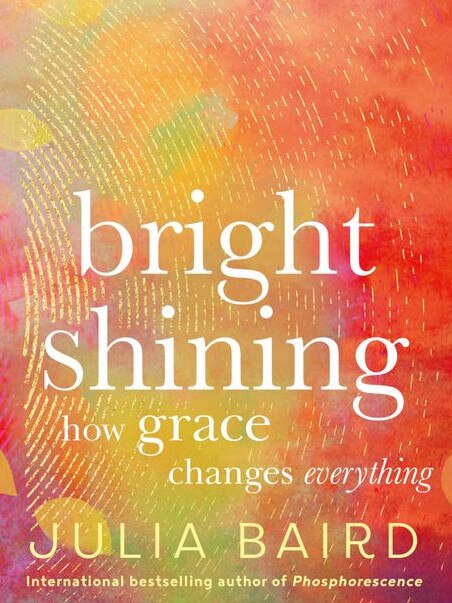Julia Baird: grace, personified
Julia Baird’s new book, Bright Shining, is an exploration of the concept of grace.

Such an old-fashioned word, grace. Did our grandparents use it as naturally as a smile or shrug? Let us say grace. We are calling our daughter Grace. That man, or that woman, has grace.
When religion was the plain weave in the texture of lives, we also said, at the end of the old Anglican church service: “May the grace of our Lord Jesus Christ, and the love of God, and the fellowship of the Holy Spirit be with us all, now and evermore. Amen.”
And there were other words: the grace which passeth all understanding. After an irritable and boring hour in church, these words changed everything. They sped us into the sunlight, placing a luminous glass across our lives, and for a few hours we saw the world illuminated by grace.

Julia Baird – author, biographer, historian as well as a print and television journalist – has a specific urgency to understand what grace is and how it annotates our lives. Almost a decade ago, in her forties, with two young children, she was diagnosed with a cancer that did not – and still doesn’t – want to be vanquished.
The possibility of death before her allotted time is present, and as Dr Johnson famously said in 1777: “When a man knows he is to be hanged in a fortnight, it concentrates his mind wonderfully.” This book encapsulates what matters now for Baird. Dr Johnson also said it matters not how a man dies, but how he lives. The act of dying is not of importance; it lasts so short a time.
Johnson’s remarks – accurate and sober – are always worth repeating, but they could have been written for Baird in 2023. Her last book – also a collection, also written in a speedy, accessible journalistic manner, also a fusion of facts, statistics and anecdote – investigated the need for awe and wonder in our lives, specifically from the natural world.
Grace, however, is more elusive, both “ineffable and unutterable”, Baird writes. Still, the elusive and unutterable have enchanted thinkers of every possible kind for thousands of years and their ideas prove useful. Baird, never stopping for breath, taps into those who have considered what grace might be.

One thing is obvious: grace is often filed under other close but incorrect names, (kindness, unselfishness, humanity). Pragmatic as always, Baird stresses that her book is in no way a definitive guide to grace. These pieces are autobiographical reflections of one finely tuned, open-hearted and self-aware woman determined to make some sense of the thing that has become increasingly central to her life. Perhaps because she notes how grace acknowledges that the “terrible can exist alongside the beautiful”, she sees how it finally “makes people whole”. At the heart of this collection is the constant presence of family – of her father, two brothers and particularly her children. Her late mother is also present.

These 18 chapters cover Baird as a journalist as well as her personal life. She has a massive file and uses popular culture, vox pops, film and music rather than old-fashioned mystics to examine grace across a range of ordinary and not-so-ordinary lives.
Grace, as she comes to understand it, is that sense of being forgiven when there is no reason in the known universe for us to be forgiven. One human is placing trust in another human when everything seems beyond repair. She writes about moral beauty: American nun Sister Helen Prejean’s forgiving love for a rapist and murderer. Prejean is taking to heart, and acting upon, the immaculate instruction of Thomas Merton: “Our job is to love others.” It is as simple as that; as impossible as that. Grace cannot be outsourced.
The key to this book, this anecdotal handbook for the human heart, is in the very last chapter where Baird quotes that most nuanced of American writers, Rebecca Solnit: We must study the good that exists, and foment it, hopefully without being cast as ignorant or impossibly idealistic.
Bright and Shining: How Grace Changes Everything has grasped this modest instruction with the earnest belief reflected in every word. This is a book for our times, our days, our hours. It is written with moral beauty and it shines brightly.
Helen Elliott is a writer and critic



To join the conversation, please log in. Don't have an account? Register
Join the conversation, you are commenting as Logout